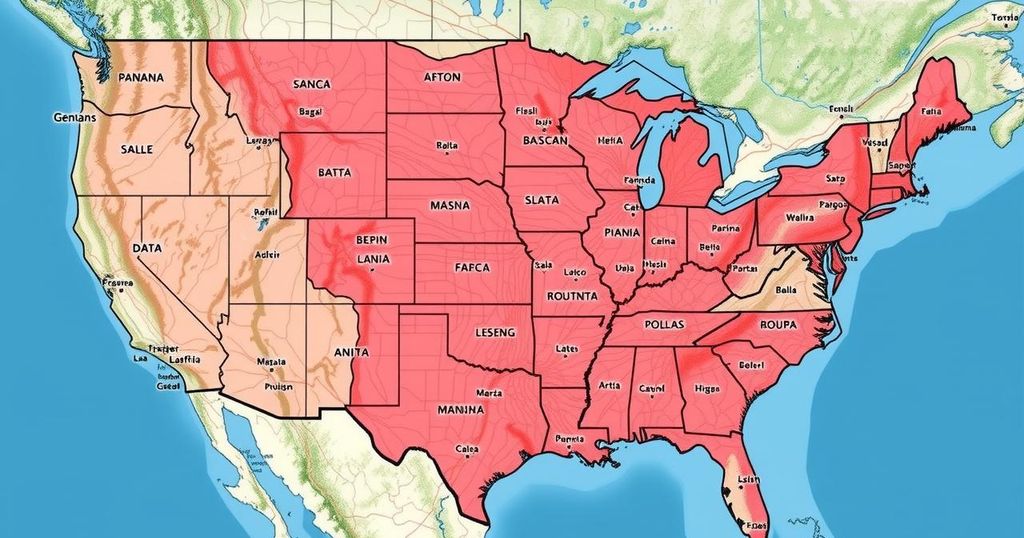Politics
ALASKA, AMERICA, ARIZONA, ASIA, ATLANTIC, BIDEN ADMINISTRATION, CANADA, CNN, CNN POLITICS, DONALD TRUMP, EUROPE, EUROPE/ASIA, FENTANYL LABS, GREENLAND, LOUISIANA, LOUISIANA PURCHASE, MEXICO, NATIONAL SECURITY, NORTH AMERICA, PACIFIC, PANAMA, PANAMA CANAL, PHILIPPINES, POLITICS, RUSSIA, TRUMP, TRUMP ADMINISTRATION, U.S. ELECTIONS, UNITED STATES, US
Leila Ramsay
0 Comments
Trump’s Provocative Comments on US Expansion into Canada, Panama, and Greenland
President-elect Donald Trump has floated ambitious ideas for territorial expansion, suggesting the incorporation of Canada as the 51st state, threatening to take back the Panama Canal, and reiterating his desire to acquire Greenland. His statements reflect a nationalistic agenda that draws on historical themes of American expansionism while provoking responses from international leaders, indicating potential diplomatic challenges ahead.
President-elect Donald Trump has reignited discussions surrounding American territorial expansion, drawing parallels with significant historical acquisitions such as the Louisiana Purchase and the acquisition of Alaska from Russia. Recently, he suggested the possibility of Canada becoming the 51st state, threatened to reclaim the Panama Canal, and reiterated his interest in acquiring Greenland, all of which appear to be driven by a mix of genuine ambition and media-catching rhetoric.
Trump’s comments regarding the Panama Canal emphasized its strategic importance for national security, reiterating a call for lowered fees for American ships traversing the canal. This echoed a nationalistic theme prevalent in his agenda, dubbed “America First,” suggesting a paradigm reminiscent of the 19th-century Manifest Destiny ideology that endorsed American territorial expansion.
In his remarks, Trump expressed that ownership of Greenland is essential for ensuring national security and global freedom. Both his approach to the Panama Canal and his desire for Greenland reflect a desire to enhance America’s influence and presence beyond its borders. Additionally, Trump articulated plans to categorize drug cartels as foreign terrorist organizations, potentially facilitating military actions in Mexico, which could strain diplomatic relations.
Responses from foreign leaders have been assertive; Panama’s President emphasized that the canal is non-negotiable and fully under Panamanian sovereignty after its transfer from the US in 1999. Similarly, leaders from Greenland and Denmark firmly rejected Trump’s acquisition proposals, affirming their territories were not for sale. Through his comments, Trump appears to provoke discussions that simultaneously negotiate and challenge the current political landscape in North America.
It should be noted that the transition team has not clarified whether these ambitious statements indicate actual policy intentions or serve a different agenda, perhaps designed to energize Trump’s base and draw attention to domestic issues. Analysts have observed that such statements reflect Trump’s method of engaging with both international and domestic political landscapes through provocative rhetoric and strategic posturing, which have historically yielded favorable immediate responses from international leaders.
The article discusses President-elect Donald Trump’s provocative statements regarding potential territorial acquisitions, which include Canada, the Panama Canal, and Greenland. These comments resonate with 19th-century expansionist sentiments while raising questions about contemporary US foreign policy and economic strategy. Trump’s administration appears to be navigating a complex web of national interests, diplomatic relations, and domestic political considerations, reflecting an aggressive stance towards perceived threats and opportunities abroad.
In summary, President-elect Donald Trump’s recent comments regarding territorial expansion reflect a mixture of genuine interest and political theatre aimed at garnering attention and support. While provoking responses from international leaders, his statements serve to reinforce his America First agenda, highlighting how territorial ambitions can intersect with broader discussions about national security and international relations. The strong rejection from foreign officials indicates a challenging diplomatic landscape ahead as Trump seeks to define his foreign policy approach.
Original Source: www.cnn.com




Post Comment